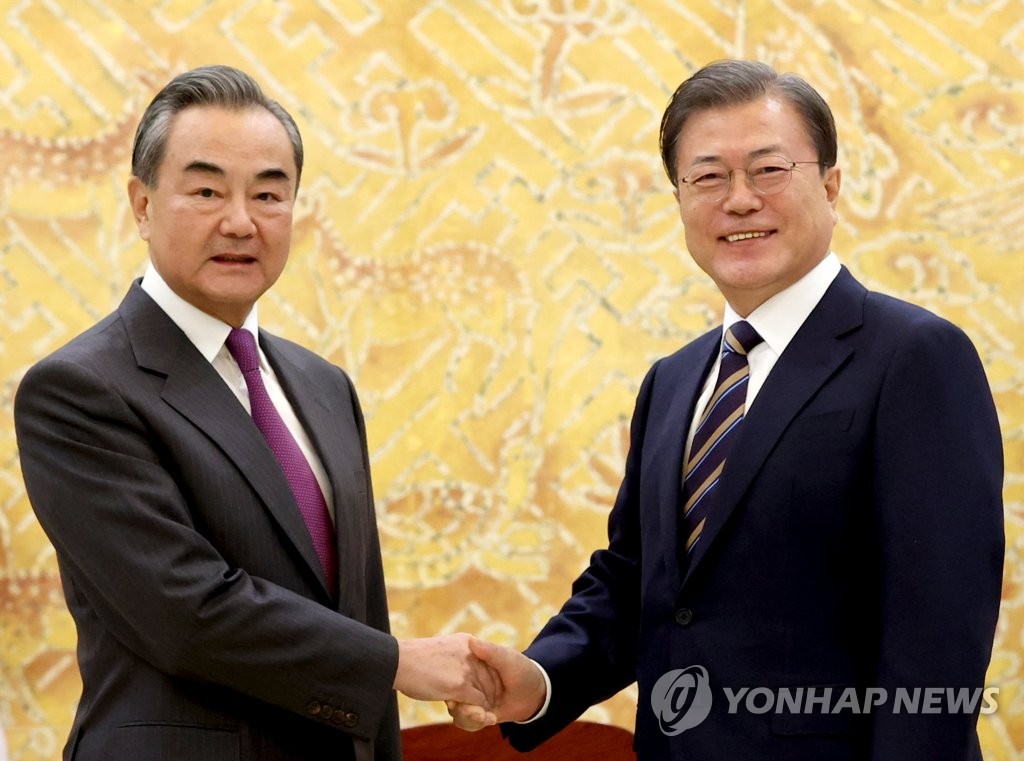- California Assembly OKs highest minimum wage in nation
- S. Korea unveils first graphic cigarette warnings
- US joins with South Korea, Japan in bid to deter North Korea
- LPGA golfer Chun In-gee finally back in action
- S. Korea won’t be top seed in final World Cup qualification round
- US men’s soccer misses 2nd straight Olympics
- US back on track in qualifying with 4-0 win over Guatemala
- High-intensity workout injuries spawn cottage industry
- CDC expands range of Zika mosquitoes into parts of Northeast
- Who knew? ‘The Walking Dead’ is helping families connect
Chinese FM Wang wraps up 3-day trip highlighting close Seoul-Beijing ties
Chinese Foreign Minister Wang Yi on Friday wrapped up a three-day visit to South Korea marked by his brisk diplomacy to cement relations between the two countries ahead of a leadership change in the United States.
While in Seoul after a trip to Japan, Wang paid a courtesy call on President Moon Jae-in and met Foreign Minister Kang Kyung-wha and ruling party grandees, in a whirlwind of diplomacy to highlight Beijing’s resolve to firm up diplomatic, economic and cultural cooperation with Seoul.
His trip came as U.S. President-elect Joe Biden envisions knitting back together America’s alliances to reassert its global leadership and confront a raft of global challenges, possibly including China’s growing assertiveness.
Asked about analysts putting his trip in the context of a Sino-U.S. rivalry, Wang told reporters that “the United States is not the only country in this world” that consists of more than 190 “independent” countries, including South Korea.
In a tweet that coincided with Wang’s trip, the U.S. State Department’s deputy spokesperson, Cale Brown, said that China’s Communist Party propaganda “can’t bury the truth” and accused party leaders of having “misled their own people about the Korean War to avoid accountability.”
Brown was referring to Beijing’s characterization of the 1950-53 conflict as the “war to resist U.S. aggression and aid Korea” — not as a fight triggered by North Korea’s invasion backed by China and the Soviet Union.
Keen attention was drawn to whether Wang’s visit here would expedite efforts to arrange a visit to Seoul by Chinese President Xi Jinping.
Wang said that Xi’s trip will take place “as soon as conditions are ripe” in a repeat of Beijing’s position that the Chinese leader can come here when the COVID-19 pandemic levels off.
During his courtesy call on Moon on Thursday, Wang reaffirmed China’s support for the development of inter-Korean relations and Seoul’s efforts to promote lasting peace on the peninsula and vowed his country’s continued cooperation, Cheong Wa Dae said in a statement.

President Moon Jae-in (R) shakes hands with Chinese Foreign Minister Wang Yi during the latter’s courtesy call on Moon at the presidential office Cheong Wa Dae in Seoul on Nov. 26, 2020. (Yonhap)
Moon said that his administration won’t let up on efforts for enduring peace on the peninsula, despite stalled inter-Korean dialogue and a protracted deadlock in nuclear negotiations between Washington and Pyongyang.
In talks with Kang on the same day, Wang touted the “robustness” and “vitality” of his country’s relations with South Korea, stressing his trip here, despite COVID-19, illustrates how much Beijing values the bilateral partnership.
“Having endured the ordeal of COVID-19, the bilateral relations are now showing robustness and the appearance of greater vitality,” he added.
A heightened Sino-U.S. rivalry over trade, technological leadership and security is expected to continue under the incoming Biden administration.
Seoul has been striving to map out a coherent diplomatic strategy to steer clear of great power geopolitical competition while seeking to maintain its decadeslong alliance with Washington and economic partnership with Beijing.











